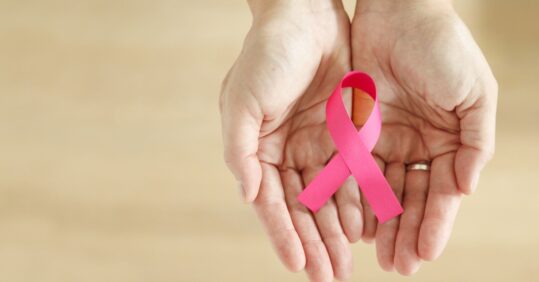More than a third of women do not regularly check breasts for changes

More than a third of women do not check their breasts regularly for signs of changes, an annual census has found.
Of the women surveyed in Avon’s 2023 Global Boob Census, 34% admitted to not checking their breasts for signs of changes at least once a month, while 10% have never checked.
The figure shows almost no improvement from last year, when the census showed 36% of women surveyed did not check their breasts for signs of breast cancer at least once a month.
This year, a quarter of the women surveyed (25%) said they are not confident they could spot a sign of breast cancer when checking their chest, with 18–24-year-olds being the least confident (30%).
Worryingly, Avon’s study of 1,001 women in the UK, carried out in August, found one in six (16%) have never been taught how to check their breasts, with only a third (33%) of these women taught in a medical or education setting.
For those who did know how to check their breasts, more than half (51%) got the information from a family member, TV or online research.
Related Article: Mythbuster: ‘I don’t need a smear test – I’ve had my HPV jab’
For those who do not check their breasts for changes monthly, over half (53%) said they forget to check, while almost three in 10 (27%) are not sure what to check for so do not do it, and more than one in 10 (12%) women are too worried to check.
Avon said it is encouraging its community to Feel The #BoobLove this Breast Cancer Awareness Month in October, because one in seven women are diagnosed with breast cancer in their lifetime and ‘early detection is critical’.
Feel The #BoobLove means women checking their breasts as part of a monthly routine, ‘which will help to understand what’s normal and what might not be’, the beauty brand explained.
‘As women, we all lead such busy lives, and it’s easy to forget to look after ourselves,’ Angela Cretu, chief executive at Avon, said.
‘We owe it to ourselves and our loved ones to think about our breast health.’
Reminding people that breast cancer awareness and early detection saves lives, Ms Cretu added that ‘by opening up the conversation and talking about our experiences, we’re raising awareness and breaking down barriers to empower more and more women to take proactive steps for their own health.’
Avon, which says it has been committed to a ‘breast cancer promise’ for over 30 years and raised more than £25 million in the UK for breast cancer charities, also conducted a study involving 439 teenage girls between the ages of 14-17.
It revealed that ‘social media is emerging as an influential platform for health education’, the beauty brand noted.
Less than half (42%) of the teenage girls surveyed said they have discussed or learned about breast health in school.
Related Article: Smoking rates fall most significantly in the North of England
Avon’s research indicates that more than a quarter (28%) are uncomfortable discussing breast health with a medical professional because they feel embarrassed talking about it (74%) and think ‘it’s private’ (26%).
Family members are ‘key sources of information’ for more than half (51%) of girls who have learned about breast health, the census revealed.
Meanwhile, social media platforms, including TikTok, also play ‘a substantial role’ in breast health awareness for over a third (35%) of teenagers, Avon found, with almost three quarters (73%) expressing a ‘higher likelihood’ of paying attention to breast health awareness messages when encountered on social media.
‘Overall, Avon’s research indicates there is still a lot of work to open up the conversation about breast cancer,’ the beauty brand said.
‘Encouraging discussion about breast health is essential from a young age to empower women and girls with awareness and confidence for their long-term health and wellbeing.’
Ms Cretu warned that, with social media proving to be ‘a key place’ for young girls and women to learn about breast health, it is important that this information comes from ‘trusted sources’.
Related Article: Boost your CPD with the redesigned Nursing in Practice 365 platform
She continued: ‘That’s why Avon is collaborating with medical professionals, educators and our network of charity partners across the world. Together we can help inspire women from a young age to know what to look for and how to seek help if they have any concerns.
‘We’ll be encouraging our millions of representatives and their customers and communities to get their boob love on!’

See how our symptom tool can help you make better sense of patient presentations
Click here to search a symptom




